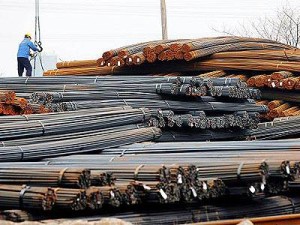 JSW Steel raises iron ore imports to six million tonnes (mt) this year, the highest by any domestic steel producer ever, with the mining crisis in Karnataka and Odisha striking at the heart of the country’s steel production capacity. While the first shipment of 1.75 lakh tonnes of high grade ore arrived from South Africa at Krishnapatnam port last week, three more shipments in capesize vessels are due to reach next week. With this the company, led by billionaire Sajjan Jindal and India’s third-largest maker of the alloy, is depending on imports to source nearly 20 per cent or upto one-fifth of its total requirement of 30 mt of iron ore per year.
JSW Steel raises iron ore imports to six million tonnes (mt) this year, the highest by any domestic steel producer ever, with the mining crisis in Karnataka and Odisha striking at the heart of the country’s steel production capacity. While the first shipment of 1.75 lakh tonnes of high grade ore arrived from South Africa at Krishnapatnam port last week, three more shipments in capesize vessels are due to reach next week. With this the company, led by billionaire Sajjan Jindal and India’s third-largest maker of the alloy, is depending on imports to source nearly 20 per cent or upto one-fifth of its total requirement of 30 mt of iron ore per year.
JSW’s plight indicates the problem being faced by steel producers as ore supplies get restricted in the domestic market. Two of the largest domestic private steel players JSW and Tata Steel have been forced to resort to imports this year to supplement domestic ore supplies and keep up production. In a strange reversal of fortune, India, the world’s third largest ore producer and a leading exporter is now facing rising ore imports.
A significant 31 per cent drop in international iron ore prices in last one year is also likely to favour higher imports this year. “We have decided to import half a million tonne of high grade iron ore every month to maintain capacity utilisation at the optimum level. That amounts to 6 mt per year which is 20 per cent of our annual needs. These imports are necessary for the company since there has been a substantial drop in production besides restrictions on movement of iron ore from state to state,” Seshagiri Rao, joint MD and CFO of JSW Steel had said. JSW Steel is mainly importing hi grade ore with Fe (iron) content of 65 per cent from South Africa and Canada. “We hope to gain due to higher productivity also save on lower fuel consumption by using such ore which has low alumina,” Rao added. JSW is believed to have clinched the supplies at $91-92 per tonne.
The recent closure of mines in Odisha and delay in reopening mines in Karnataka and Goa have resulted in acute shortage of iron ore in the country. Last month Tata Steel which has so far been self-sufficient in iron ore and relying on its captive mines, imported two shipments of iron ore for what the company described as ‘testing purpose.’
A metal sector analyst pointed out since international prices are hovering in the range of $94-95 per tonne, top steel majors could find a window of opportunity through imports in this quarter leading to substantially higher quantities of imports. Incidentally in 2013-14 imports of iron ore were estimated to have been around 0.5 mt.
Capacity utilization in India’s steel industry has come down significantly to 77 per cent in 2013-14 from 88 per cent in 2010-11 due to problems related to mining in key states like Karnataka, Goa and Odisha. During the period, output of iron ore went down drastically from 208 mt in in 2009-10 to 144 mt in 2013-14. This year ore production is estimated to fall further to 100 mt against demand of 136 mt.
Supply constraints have led to a surge in iron ore prices in India adding to the steel industry’s woes at a time when international prices of iron ore have fallen more than 30 per cent. Top domestic steelmakers have also begun lobbying with the government for an effective raw material policy, including removal of 2.5 per cent import duty on iron ore. “Mining problem in India for the divergent trend in in global and Indian ore prices. There is little justification for a 2.5 per cent duty on iron ore imports,” Mr Rao added. On its part, the steel ministry has indicated that the government is likely to consider the demand favourably, since it is keen to facilitate raw material supplies for domestic steel producers.



